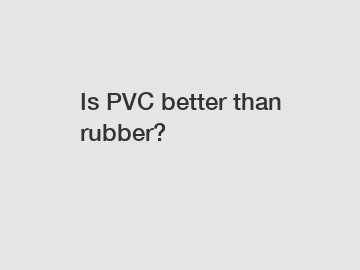Is PVC Better Than Rubber?
When it comes to choosing between PVC and rubber, there is often a debate on which material is superior. Both PVC (Polyvinyl Chloride) and rubber have their own set of advantages and disadvantages, making it important to understand the differences between the two before making a decision. In this article, we will analyze the characteristics, uses, and benefits of PVC and rubber, ultimately determining which material is better suited for specific applications.
PVC: A Flexible and Durable Material.

PVC is known for its flexibility, durability, and resistance to abrasion and chemicals. It is produced through the polymerization of vinyl chloride monomers, resulting in a sturdy and versatile material that is suitable for a wide range of applications. PVC is used in various industries such as construction, healthcare, automotive, and electronics.
1. Characteristics of PVC.
PVC is a thermoplastic polymer that can be easily molded into different shapes and sizes. It is available in both rigid and flexible forms, allowing for a diverse range of applications. PVC is inherently flame retardant, making it a safe choice for products that require resistance to fire. Additionally, PVC has excellent electrical insulation properties, making it suitable for wiring and cable insulation.
2. Uses of PVC.
One of the key advantages of PVC is its use in the construction industry. PVC pipes and fittings are extensively used for plumbing, drainage systems, and irrigation due to their exceptional durability and corrosion resistance. PVC is also widely utilized in window frames, flooring, roofing membranes, and decorative applications such as wallpaper. In the healthcare sector, PVC is used for medical tubing, blood bags, and other medical devices due to its biocompatibility and sterilization resistance.
3. Benefits of PVC.
PVC offers several benefits over rubber. Firstly, PVC is a cost-effective material, making it more affordable for large-scale applications. It requires less maintenance and has a longer lifespan compared to rubber, reducing replacement costs. PVC is also a lightweight material, making it easier to handle and transport. Furthermore, PVC can be recycled, promoting sustainability and reducing environmental impact.
Rubber: A Versatile and Resilient Material.
Rubber is a widely used material known for its elasticity, shock absorption, and insulation properties. It is derived from natural sources such as latex or synthetic materials like neoprene and silicone. Rubber finds applications in industries such as automotive, manufacturing, electronics, and healthcare.
1. Characteristics of Rubber.
Rubber is a natural insulator that provides exceptional flexibility and resilience. It has excellent resistance to impact, tearing, and UV radiation. Additionally, rubber exhibits good stability in extreme temperatures, making it suitable for outdoor applications. It also offers superior vibration and noise damping capabilities.
2. Uses of Rubber.
Rubber is commonly used in the automotive industry for tires, hoses, gaskets, and seals due to its ability to withstand high pressure and temperature fluctuations. It is also utilized for manufacturing conveyor belts, industrial flooring, and rubber mats for its slip-resistant properties. In the healthcare sector, rubber gloves, catheters, and medical seals rely on rubber's biocompatibility and hygiene factors.
3. Benefits of Rubber.
Rubber has several advantages over PVC, particularly in applications that require high elasticity and shock absorption. It provides superior traction and grip, making it ideal for slip-resistant surfaces. Rubber also offers excellent sealing properties, preventing leakage and ensuring airtightness. Moreover, rubber is highly resistant to weathering and ozone, making it suitable for outdoor environments.
Conclusion.
While both PVC and rubber have their own unique characteristics and benefits, choosing the appropriate material ultimately depends on the specific requirements of the application. PVC offers flexibility, durability, and cost-effectiveness, making it a preferred choice for various industries. On the other hand, rubber provides superior elasticity, insulation, and resilience, making it ideal for applications that require vibration damping and slip resistance. By understanding the differences between PVC and rubber, one can make an informed decision.
If you are in need of further information or assistance regarding the choice between PVC and rubber, please do not hesitate to contact us. Our team of experts will be happy to help you make the right decision for your specific needs.
Contact us to discuss your requirements of custom PVC work safety boots, safety boots white, pvc safety boots for construction industry. Our experienced sales team can help you identify the options that best suit your needs.



Comments
Please Join Us to post.
0